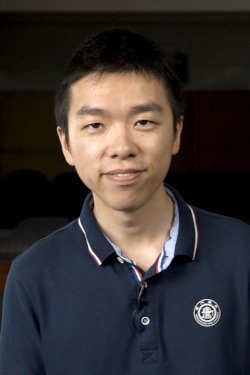Juntao Ye
2019 Regional Award Winner — Post-Doc

Current Position:
Associate Professor
Institution:
Shanghai Jiao Tong University (Previously, Cornell University)
Discipline:
Organic Chemistry

Current Position:
Associate Professor
Institution:
Shanghai Jiao Tong University (Previously, Cornell University)
Discipline:
Organic Chemistry
Recognized for: Developing novel synthetic methods that directly and selectively functionalize unactivated Carbon-Hydrogen bonds. These new methods provide more efficient and cheaper ways to convert readily available chemicals into value-added and pharmaceutically relevant products, than currently available methods allow.
Areas of Research Interest and Expertise: Synthetic Methodology, Organic Synthesis, Transition-Metal Catalysis, Photoredox Catalysis
Biography:
Postdoctoral Research Associate, Columbia University
Postdoctoral Research Associate, University of Toronto
PhD, Shanghai Institute of Organic Chemistry, University of Chinese Academy of Sciences, China
BSc, Huazhong University of Science and Technology, China
Research Summary:
Dr. Ye is an organic chemist working to develop novel synthetic methodologies for the synthesis of bioactive and/or pharmaceutically relevant compounds, with a focus on direct functionalization of carbon-hydrogen (C-H) bonds. Functionalization is a reaction where a C-H bond is cleaved and replaced with a C-X bond, where is usually a Carbon, Nitrogen or oxygen atom. C-H bonds are ubiquitous in organic molecules and hence, in order to synthesize a particular target molecule through C-H functionalization, it is necessary to selectively break these bonds and then combine them with other molecules.
Conventional methods selectively break C-H bonds by employing directing groups, which are substituents that make a part of a molecule more reactive. However, the addition and removal of these directing groups require additional synthetic steps. As a general rule of thumb, the more steps in a synthetic sequence, the lower your overall product yields and the higher your cost will become, and the more chemical wastes will be generated. As such, adding additional steps in a synthesis can lower the practicality of the method and thus limit its application in target-directed synthesis.
Dr. Ye’s innovative synthetic methodologies also employ directing groups, but use groups that are generated and removed in the same reaction step. These are called transient directing groups and do not require additional synthetic steps for their addition and removal, and thus have the advantages of improving synthetic efficiency, lowering cost and reducing wastes, making these methods more appealing to process chemists for industrial scale synthesis and medicinal chemists for accelerating the drug discovery process.
“My research is aimed at developing efficient, selective, and economical methods for the synthesis of value-added and pharmaceutically relevant compounds from readily available chemicals. My research goal is to develop new synthetic methods that accelerate the pace of drug discovery and lower the cost of pharmaceutical drugs.”
Key Publications:
Other Honors:
2019 Thousand Youth Talents Plan, China
2013 Outstanding Graduate Students of Shanghai, China
In the Media:
Nature Chemistry – A shortcut to molecular complexity
Chem – Synergistic CO2 Mediation and Photocatalysis for α-Alkylation of Primary Aliphatic Amines